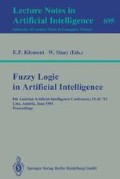Abstract
First, we make some remarks concerning the definition of connectives in fuzzy logic. We point out possible disadvantages of considering exclusively t-norms and t-conorms as proper models for the conjunction and disjunction. Coincidence of S- and R-implications is investigated by solving functional equations for conjunctions. Then, we suggest a constructive approach to axiomatics of the generalized modus ponens (GMP). Besides a special model, a particular class of conjunctions satisfying the axioms for GMP and based on the Hamacher family of t-norms is also characterized. On the other hand, the coincidence of R- and S-implications defined by the members of this class is verified.
Partially supported by OTKA.
Preview
Unable to display preview. Download preview PDF.
References
Weber, S.: A general concept of fuzzy connectives, negations and implications based on t-norms and t-conorms. Fuzzy Sets and Systems 11 (1983) 115–134
Dubois, D., and Prade, H.: Fuzzy sets in approximate reasoning, Part 1: Inference with possibility distributions. Fuzzy Sets and Systems 40 (1991) 143–202
Fodor, J. C.: On fuzzy implication operators. Fuzzy Sets and Systems 42 (1991) 293–300
Smets, P., and Magrez, P.: Implications in fuzzy logic. Int. J. Approximate Reasoning 1 (1987) 327–347
Magrez, P., and Smets, P.: Fuzzy modus ponens: a new model suitable for applications in knowledge-based systems. Internat. J. Intelligent Systems 4 (1989) 181–200
Hamacher, H.: Über logische Verknüpfungen unscharfer Aussagen und deren zugehörige Bewertungsfunktionen. Working Paper 75/14, RWTH Aachen, Aachen, Germany (1975)
Schweizer, B., and Sklar, A.: Probabilistic Metric Spaces. North-Holland, Amsterdam, 1983
Dubois, D., and Prade, H.: A theorem on implication functions defined from triangular norms. Stochastica VIII (1984) 267–279
Fodor, J. C.: A new look at fuzzy connectives. Technical Report TR 91/1, Computer Center, Eötvös L. University, Budapest, Hungary, 1991.
Trillas, E., and Valverde, L.: On mode and implication in approximate reasoning. In: M. M. Gupta, A. Kandel, W. Bandler, J. B. Kiszka (eds.): Approximate Reasoning in Expert Systems. North-Holland, Amsterdam, 1985, pp. 157–166
Fodor, J. C., and Keresztfalvi, T.: Non-standard connectives in fuzzy logic. Proc. of 2nd IEEE Int. Conf. on Fuzzy Systems, San Francisco, March 28–April 1, 1993
Author information
Authors and Affiliations
Editor information
Rights and permissions
Copyright information
© 1993 Springer-Verlag Berlin Heidelberg
About this paper
Cite this paper
Fodor, J.C., Keresztfalvi, T. (1993). Non-conventional conjunctions and implications in fuzzy logic. In: Klement, E.P., Slany, W. (eds) Fuzzy Logic in Artificial Intelligence. FLAI 1993. Lecture Notes in Computer Science, vol 695. Springer, Berlin, Heidelberg. https://doi.org/10.1007/3-540-56920-0_4
Download citation
DOI: https://doi.org/10.1007/3-540-56920-0_4
Published:
Publisher Name: Springer, Berlin, Heidelberg
Print ISBN: 978-3-540-56920-6
Online ISBN: 978-3-540-47782-2
eBook Packages: Springer Book Archive

